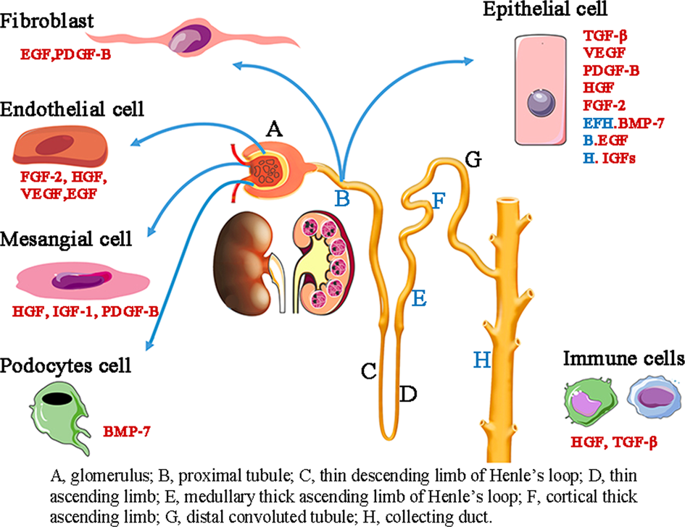当前位置:
X-MOL 学术
›
Signal Transduct. Target Ther.
›
论文详情
Our official English website, www.x-mol.net, welcomes your
feedback! (Note: you will need to create a separate account there.)
Potential targeted therapy and diagnosis based on novel insight into growth factors, receptors, and downstream effectors in acute kidney injury and acute kidney injury-chronic kidney disease progression.
Signal Transduction and Targeted Therapy ( IF 40.8 ) Pub Date : 2020-02-14 , DOI: 10.1038/s41392-020-0106-1 Li Gao 1 , Xiang Zhong 2 , Juan Jin 3 , Jun Li 1 , Xiao-Ming Meng 1
Signal Transduction and Targeted Therapy ( IF 40.8 ) Pub Date : 2020-02-14 , DOI: 10.1038/s41392-020-0106-1 Li Gao 1 , Xiang Zhong 2 , Juan Jin 3 , Jun Li 1 , Xiao-Ming Meng 1
Affiliation

|
Acute kidney injury (AKI) is defined as a rapid decline in renal function and is characterized by excessive renal inflammation and programmed death of resident cells. AKI shows high morbidity and mortality, and severe or repeated AKI can transition to chronic kidney disease (CKD) or even end-stage renal disease (ESRD); however, very few effective and specific therapies are available, except for supportive treatment. Growth factors, such as epidermal growth factor (EGF), insulin-like growth factor (IGF), and transforming growth factor-β (TGF-β), are significantly altered in AKI models and have been suggested to play critical roles in the repair process of AKI because of their roles in cell regeneration and renal repair. In recent years, a series of studies have shown evidence that growth factors, receptors, and downstream effectors may be highly involved in the mechanism of AKI and may function in the early stage of AKI in response to stimuli by regulating inflammation and programmed cell death. Moreover, certain growth factors or correlated proteins act as biomarkers for AKI due to their sensitivity and specificity. Furthermore, growth factors originating from mesenchymal stem cells (MSCs) via paracrine signaling or extracellular vesicles recruit leukocytes or repair intrinsic cells and may participate in AKI repair or the AKI-CKD transition. In addition, growth factor-modified MSCs show superior therapeutic potential compared to that of unmodified controls. In this review, we summarized the current therapeutic and diagnostic strategies targeting growth factors to treat AKI in clinical trials. We also evaluated the possibilities of other growth factor-correlated molecules as therapeutic targets in the treatment of AKI and the AKI-CKD transition.
中文翻译:

基于对急性肾损伤和急性肾损伤-慢性肾病进展中生长因子、受体和下游效应器的新见解,可能的靶向治疗和诊断。
急性肾损伤(AKI)被定义为肾功能迅速下降,其特征是过度的肾脏炎症和常驻细胞的程序性死亡。 AKI具有较高的发病率和死亡率,严重或反复的AKI可转变为慢性肾脏病(CKD)甚至终末期肾病(ESRD);然而,除了支持性治疗外,很少有有效且特异的治疗方法。生长因子,如表皮生长因子 (EGF)、胰岛素样生长因子 (IGF) 和转化生长因子-β (TGF-β),在 AKI 模型中发生显着改变,并被认为在修复中发挥关键作用AKI 的过程是因为它们在细胞再生和肾脏修复中的作用。近年来,一系列研究表明,生长因子、受体和下游效应器可能高度参与AKI的发生机制,并可能在AKI早期发挥作用,通过调节炎症和程序性细胞死亡来响应刺激。此外,某些生长因子或相关蛋白由于其敏感性和特异性而可作为 AKI 的生物标志物。此外,源自间充质干细胞 (MSC) 的生长因子通过旁分泌信号传导或细胞外囊泡招募白细胞或修复内在细胞,并可能参与 AKI 修复或 AKI-CKD 转变。此外,与未修饰的对照相比,生长因子修饰的 MSC 显示出优越的治疗潜力。在这篇综述中,我们总结了目前临床试验中针对生长因子治疗 AKI 的治疗和诊断策略。我们还评估了其他生长因子相关分子作为 AKI 和 AKI-CKD 转变治疗靶点的可能性。
更新日期:2020-02-14
中文翻译:

基于对急性肾损伤和急性肾损伤-慢性肾病进展中生长因子、受体和下游效应器的新见解,可能的靶向治疗和诊断。
急性肾损伤(AKI)被定义为肾功能迅速下降,其特征是过度的肾脏炎症和常驻细胞的程序性死亡。 AKI具有较高的发病率和死亡率,严重或反复的AKI可转变为慢性肾脏病(CKD)甚至终末期肾病(ESRD);然而,除了支持性治疗外,很少有有效且特异的治疗方法。生长因子,如表皮生长因子 (EGF)、胰岛素样生长因子 (IGF) 和转化生长因子-β (TGF-β),在 AKI 模型中发生显着改变,并被认为在修复中发挥关键作用AKI 的过程是因为它们在细胞再生和肾脏修复中的作用。近年来,一系列研究表明,生长因子、受体和下游效应器可能高度参与AKI的发生机制,并可能在AKI早期发挥作用,通过调节炎症和程序性细胞死亡来响应刺激。此外,某些生长因子或相关蛋白由于其敏感性和特异性而可作为 AKI 的生物标志物。此外,源自间充质干细胞 (MSC) 的生长因子通过旁分泌信号传导或细胞外囊泡招募白细胞或修复内在细胞,并可能参与 AKI 修复或 AKI-CKD 转变。此外,与未修饰的对照相比,生长因子修饰的 MSC 显示出优越的治疗潜力。在这篇综述中,我们总结了目前临床试验中针对生长因子治疗 AKI 的治疗和诊断策略。我们还评估了其他生长因子相关分子作为 AKI 和 AKI-CKD 转变治疗靶点的可能性。











































 京公网安备 11010802027423号
京公网安备 11010802027423号